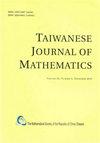A New Condition for $k$-Wall–Sun–Sun Primes
IF 0.6
4区 数学
Q3 MATHEMATICS
引用次数: 2
Abstract
Let $k \geq 1$ be an integer, and let $(U_{n})$ be the Lucas sequence of the first kind defined by \[ U_{0} = 0, \quad U_{1} = 1 \quad \textrm{and} \quad U_{n} = kU_{n-1} + U_{n-2} \quad \textrm{for $n \geq 2$}. \] It is well known that $(U_{n})$ is periodic modulo any integer $m \geq 2$, and we let $\pi(m)$ denote the length of this period. A prime $p$ is called a $k$-Wall–Sun–Sun prime if $\pi(p^{2}) = \pi(p)$. Let $f(x) \in \mathbb{Z}[x]$ be a monic polynomial of degree $N$ that is irreducible over $\mathbb{Q}$. We say $f(x)$ is monogenic if $\Theta = \{ 1, \theta, \theta^{2}, \ldots, \theta^{N-1} \}$ is a basis for the ring of integers $\mathbb{Z}_{K}$ of $K = \mathbb{Q}(\theta)$, where $f(\theta) = 0$. If $\Theta$ is not a basis for $\mathbb{Z}_{K}$, we say that $f(x)$ is non-monogenic. Suppose that $k \not\equiv 0 \pmod{4}$ and that $\mathcal{D} := (k^{2}+4)/\gcd(2,k)^{2}$ is squarefree. We prove that $p$ is a $k$-Wall–Sun–Sun prime if and only if $\mathcal{F}_{p}(x) = x^{2p}-kx^{p}-1$ is non-monogenic. Furthermore, if $p$ is a prime divisor of $k^{2}+4$, then $\mathcal{F}_{p}(x)$ is monogenic.k -Wall-Sun-Sun质数的一个新条件
设$k \geq 1$为整数,$(U_{n})$为\[ U_{0} = 0, \quad U_{1} = 1 \quad \textrm{and} \quad U_{n} = kU_{n-1} + U_{n-2} \quad \textrm{for $n \geq 2$}. \]定义的第一类Lucas序列。众所周知,$(U_{n})$是对任意整数$m \geq 2$的周期模,我们设$\pi(m)$表示这个周期的长度。质数$p$被称为$k$ -Wall-Sun-Sun质数如果$\pi(p^{2}) = \pi(p)$。设$f(x) \in \mathbb{Z}[x]$为次为$N$的一元多项式,在$\mathbb{Q}$上不可约。如果$\Theta = \{ 1, \theta, \theta^{2}, \ldots, \theta^{N-1} \}$是$K = \mathbb{Q}(\theta)$的整数环$\mathbb{Z}_{K}$的基,我们说$f(x)$是单基因的,其中$f(\theta) = 0$。如果$\Theta$不是$\mathbb{Z}_{K}$的基础,我们说$f(x)$是非单基因的。假设$k \not\equiv 0 \pmod{4}$和$\mathcal{D} := (k^{2}+4)/\gcd(2,k)^{2}$是无平方的。我们证明$p$是一个$k$ -Wall-Sun-Sun素数当且仅当$\mathcal{F}_{p}(x) = x^{2p}-kx^{p}-1$是非单基因的。此外,如果$p$是$k^{2}+4$的素数因子,那么$\mathcal{F}_{p}(x)$是单基因的。
本文章由计算机程序翻译,如有差异,请以英文原文为准。
求助全文
约1分钟内获得全文
求助全文
来源期刊
CiteScore
1.10
自引率
0.00%
发文量
35
审稿时长
3 months
期刊介绍:
The Taiwanese Journal of Mathematics, published by the Mathematical Society of the Republic of China (Taiwan), is a continuation of the former Chinese Journal of Mathematics (1973-1996). It aims to publish original research papers and survey articles in all areas of mathematics. It will also occasionally publish proceedings of conferences co-organized by the Society. The purpose is to reflect the progress of the mathematical research in Taiwan and, by providing an international forum, to stimulate its further developments. The journal appears bimonthly each year beginning from 2008.

 求助内容:
求助内容: 应助结果提醒方式:
应助结果提醒方式:


